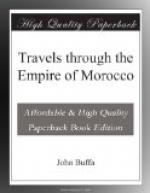Notwithstanding all these apparent obstacles to health, they contrive to preserve it admirably well. To an Englishman, their mode of life would scarcely appear worthy to be called living, but merely vegetating. Since the last plague, however, in Barbary, which destroyed a vast number of the Jews, they have not suffered from any infectious or contagious disorder, and their population has augmented so prodigiously, that the Emperor must, however reluctantly, extend the limits of their town. The Jews marry extremely young. It is not at all unusual to see a married couple, whose united ages do not exceed twenty-two or twenty-three years.
I cannot quit Tetuan, without giving you some account of Ceuta, which is at so small a distance from it. From its situation, it perfectly corresponds with the Exillissa of Ptolemy, being the first maritime town to the eastward of the ancient Tingis, or modern Tangiers. It also clearly appears to have been the Septa described by Procopius, who, with many others, derives this name from the adjacent seven hills. It was a place of great note in the time of the Vandals. It is now a strong regular fortified town. Ceuta is thirty miles from Tangiers, and nearly opposite to the entrance of the bay of Gibraltar. It is nominally still in the hands of the Spaniards; but it is confidently rumoured, and believed, to have been ceded by treaty to the French. This important fortress has been, and is still, occasionally most awfully distressed for want of provisions; insomuch, that if closely besieged by land, by the Moors, and blocked up by the English by sea, it could not hold out any considerable time in possession of the French. The advantages resulting to Great Britain from such a valuable acquisition are incalculable.
Every person who is acquainted with the situation of Ceuta, the rival of Gibraltar, must be very much astonished, that it should still be permitted to remain in the possession of the Spaniards, since a squadron of men of war, and a flotilla of gun and bomb vessels, might reduce it, even without the assistance, of the Moors; and thereby England would be sole mistress of the entrance to the Mediterranean. Convoys could collect in safety at Ceuta, and our trade in this sea be comparatively secure from annoyance. I understand this place was closely invested by Muley Yezid (the late Emperor of Morocco, and brother to the present Emperor), but for want of proper co-operation by sea, where it is most vulnerable, he was necessitated to raise the siege, and withdraw his troops.
This garrison is supplied with provisions from Spain, the Moors being prohibited, on pain of death, from sending their commodities thither; and in order that this interdiction may be strictly observed, picquets and posts of Moorish cavalry and infantry are so judiciously stationed, that it is impossible for the mountaineers to smuggle in the smallest article. The supplies from Spain are extremely precarious, from the necessity of conveying them in small fishing craft, to prevent their falling into the hands of the English.




